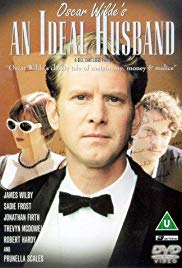
AN IDEAL HUSBAND
UK, 1998, 90 minutes, Colour.
James Wilby, Sadie Frost, Jonathan Firth, Trevyn Mc Dowell, Robert Hardy, Karen Hayley, Prunella Scales.
Directed by Bill Cartlage.
An Ideal Husband is a celebrated play by Oscar Wilde. Not quite as famous as The Importance of Being Ernest, it has been continually performed on stage for over 100 years and there have been significant film versions, one of the 1940s with Paulette Goddard and Michael Wilding, a lavish version in 1999 with Jeremy Northam, Cate Blanchett, Julianne Moore and Rupert Everett.
This film, with a much smaller budget, more like a production for television, was released the year before the 1999 version. Its cast is not so well-known, though James Wilby had a career in performing similar kinds of characters (for example in the version of E. M. Forster’s Maurice). It is certainly a surprise to see Sadie Frost, not the greatest of actresses, as Mrs Cheevley, though it is pointed out that the actress is much the same age as Wilde’s Mrs Cheevley, rather than an older, more mature woman.
Perhaps much more effective is Jonathan Firth, Colin Firth’s brother, as Arthur Goring, a more complex character, with much of the witticisms and self-deprecation of Wilde’s dialogue, involved in his friendship with Robert Chiltern and his wife, and in love with Robert’s sister, Mabel. There is a bonus in having Robert Hardy as Arthur’s father, continually criticising him. And Prunella Scales has a few scenes as Lady Markby.
The originality of this version is that it is set in the 1990s, in a rather sophisticated and sometimes swinging British country city, an emphasis on local politics before national politics, a background of business deals, integrity in politics and the doing of shady financial deals. Which means that Robert Chiltern is not necessarily an ideal husband and his past is exposed, and he is threatened by Mrs Cheevley and her letter so that he will promote her cause, something to which he is quite opposed, in Council meetings. His wife holds him on a pedestal but is caught in an emotional trick by Mrs Cheevley and has to modify her stances.
While the other film versions make a greater impact, this one is interesting in hearing Wilde’s dialogue a hundred years later in a modern setting as well as the adaptation to England 100 years on.
1. The status of Oscar Wilde’s play? Continually in theatre? Film versions? The 1940s, the 1990s?
2. Wilde and his dialogue, wit, satire? Creation of characters and interactions? Compromising situations? The play in the 1890s?
3. This version updated to the 20th century? How well did this work? In terms of the characters, the dialogue and repartee from the 19th century? The political situation? Political blackmail? Integrity and politics? Ideals, falling from ideals? Perfectionists and their having to admit reality?
4. Robert Chiltern as an ideal husband and politician? His career? His relationship with his wife, his ambitions, her supporting them? His relationship with his sister? His friendship with Arthur? The party and the appearance of Mrs Cheevley? The discussions, her plan, moneymaking, having the document, the blackmail, the deadlines? The effect on Robert, agreeing to her demands, saving his political life? The tension with his wife and her ideals, her persuading him to write and deny Mrs Cheevley? The discussions with Arthur, his admission of the past, the influence of the Baron and his financial advice, the visualising of this in flashbacks? Audience response to the case, his integrity? His decision to give the speech in Parliament, Lord Caversham and his praise? Confronting Mrs Cheevley, her retiring?
5. Mrs Cheevley, her past, living abroad, the relationship with Arthur, his breaking it off? Her appearance, her dress, seductive, young? Her plan, the business deal, the money, having the document against Robert? Threatening him? Her visit to Arthur, his clash with her? After finding the brooch, her claiming it, his knowing it was stolen after he had given it as a gift? Not releasing the spring? His hold over her, the potential of the police, her backing out? Yet her sending Gertrude’s note anonymously to Robert? And Robert interpreting it as Gertrude’s love and trust for him? Motivating him to make the speech?
6. Gertrude, a proud woman, not liking Mrs Cheevley, memories of school days, hostess at the party, relationship with Mabel? Robert telling her the truth, her shock, wanting integrity? Her note to Arthur? Not going? Having to admit the truth about the note to Robert, her realising that she was vulnerable to less than perfect action? The reconciliation?
7. Arthur, man about town, his way with Oscar Wilde’s words, his father’s continued criticism of him? His love for Mabel? Her mistrust? Arthur and his discussions with Robert, the issues of integrity, the note, the bracelet, Mrs Cheevley, burning the document, the police hold over Mrs Cheevley? His proposal to Mabel?
8. Lady Markby and her association with Mrs Cheevley, bring her to the party, the next day, lady Markby and her social style and chatter?
9. Lord Caversham, the uppercrust, continuing to criticise his son, as a wastrel? His praise of Robert? Happy that his son was engaged?
10. Robert and his decision to resign, Gertrude having to confess to him, persuading him to go on and put the past behind him? Roberts forbidding Arthur to marry Mabel – and then the change?
11. The dramatic intrigue, the emotional intrigue?